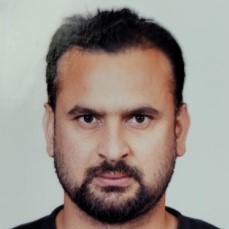Metal Organic Frameworks (MOFs) Derived Nanomaterials for Energy Storage Applications
A special issue of Electrochem (ISSN 2673-3293).
Deadline for manuscript submissions: closed (30 November 2023) | Viewed by 324
Special Issue Editors
Interests: energy storage and conversion applications; wastewater treatment
Special Issues, Collections and Topics in MDPI journals
Special Issue Information
Dear Colleagues,
Owing to the mushrooming growth of human population, industrial revolution, and optimal usage of electronic gadgets, there is an urgent call for the production of green energy that could fulfill the energy supply of modern society. The energy production from sustainable and renewable resources such as wind and solar play a pivotal role in power supply. Instead, their seasonal behavior and unstable power supply shield their utilization for potential applications. Consequently, it is urgent to develop inventive high-power energy systems to fulfill the energy demand for both residential and industrial usage in the future. Among the bunch of energy storage devices, electrochemical capacitors (supercapacitors or ultra-capacitors) captivate enormous attention towards diverse research activities, thanks to their fast charge/discharging rate, high power density, low maintenance and long-term cyclic performance. Additionally, they have been worked as auspicious candidates owing to their high energy density than conventional capacitors and high-power density than batteries. Supercapacitors can provide an uninterruptable power source in hybrid electric vehicles, smart electric grids, memory back-up equipment as well as various medical devices. Meanwhile, the designation and development of electrode materials is a crucial factor to achieve the high energy and power density based supercapacitors.
Metal-organic frameworks (MOFs), composed of organic linkers and inorganic moieties, are supposed to be an emerging template to develop hollow and porous nanoarchitecture and tailored configurations for multifarious energy related applications. Additionally, it has been reported that MOFs induced nanoarchitecture manifested great potential for SCs owing to their immense specific surface area and presence of pertinent mesopores. MOFs derived various nanomaterials including transition metal layered double hydroxides (LDHs), chalcogenides, porous carbon, etc., are regarded as the auspicious electrode materials for high-performance supercapacitors. However, the MOFs derived materials still suffer from possible agglomeration leading to depletion in electrochemical performance of SCs. In this scenario, some breakthroughs related to MOFs derived nanomaterials are still prescribed for their appropriate implementation from the commercial point of view.
This Special Issue aims to cover the synthesis, characterization, and energy storage applications of MOFs derived nanomaterials, which can ameliorate the designation and development of highly efficient and low-cost electrode materials for supercapacitors. At the same time, we believe that this Special Issue provides some new insights of MOFs-based nanomaterials for electrochemical energy storage applications.
Dr. Gunendra Prasad Ojha
Dr. Jiwan Acharya
Guest Editors
Manuscript Submission Information
Manuscripts should be submitted online at www.mdpi.com by registering and logging in to this website. Once you are registered, click here to go to the submission form. Manuscripts can be submitted until the deadline. All submissions that pass pre-check are peer-reviewed. Accepted papers will be published continuously in the journal (as soon as accepted) and will be listed together on the special issue website. Research articles, review articles as well as short communications are invited. For planned papers, a title and short abstract (about 100 words) can be sent to the Editorial Office for announcement on this website.
Submitted manuscripts should not have been published previously, nor be under consideration for publication elsewhere (except conference proceedings papers). All manuscripts are thoroughly refereed through a single-blind peer-review process. A guide for authors and other relevant information for submission of manuscripts is available on the Instructions for Authors page. Electrochem is an international peer-reviewed open access quarterly journal published by MDPI.
Please visit the Instructions for Authors page before submitting a manuscript. The Article Processing Charge (APC) for publication in this open access journal is 1000 CHF (Swiss Francs). Submitted papers should be well formatted and use good English. Authors may use MDPI's English editing service prior to publication or during author revisions.
Keywords
- metal organic frameworks (MOFs)
- supercapacitors
- energy density
- power density
- cyclic stability





